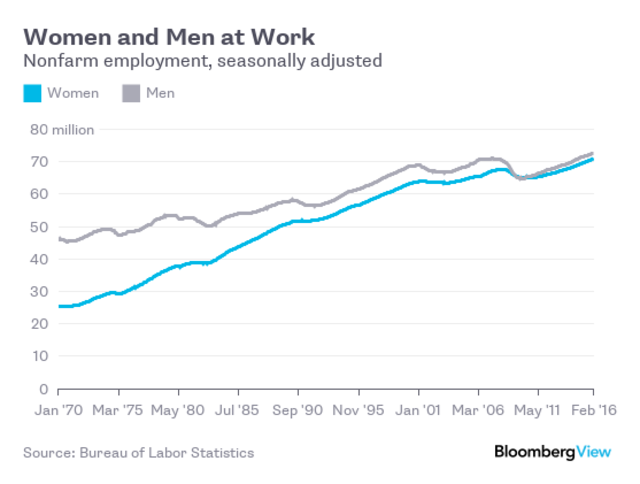Are men really under attack in today's modern day workplace? One economics columnist looks at whether there is any basis behind this claim
(Bloomberg View) – According to the Bureau of Labor Statistics, there are 5.1 million professional drivers of assorted motor vehicles (that’s leaving out boats, trains and trolleys) in the US. Eighty-nine per cent of them are men.
If and when driving is automated, most of those jobs will probably disappear. And it’s not as if wiping out male-dominated occupations is anything new. Manufacturing, in which men currently hold 73 per cent of the jobs, employed 13.7 million men in June 1979 and 9 million in February. That’s 4.7 million jobs gone over a period during which the male population grew by almost 50 million. Women's manufacturing employment has actually seen a somewhat steeper decline, from 5.8 million to 3.4 million, in part because of the near wipeout of apparel manufacturing in the US. And there are other female-dominated industries that have suffered – travel agencies went from employing 136,200 women in October 2000 to 64,800 in January. But on the whole, changes in the workplace since the 1970s have hit men much harder than women:

As you can (barely) see from the chart, the number of women on US payrolls topped the number of men for a few months in 2009 and 2010 in the aftermath of the recession, and the lines are still much closer together than before the recession. Interestingly, women came nowhere close to passing men in the other jobs count, the household survey in which individuals say whether or not they’re employed (as opposed to employers providing the data). That in itself may be telling. Four economists with a lot of experience in such matters hypothesised in 2009 that when labour markets are weak, many people with off-the-books or other marginal work show up in the household survey but not the employer survey. My take: More men than women are stuck with jobs that aren't quite jobs.
There are of course still lots of high-status, high-pay fields dominated by men. According the BLS, men occupy 61 per cent of managerial jobs in the US, 75 per cent of computer and mathematical jobs and 85 per cent of architecture and engineering jobs. Get into the rarefied and extremely well-compensated territory of top corporate executives, Hollywood directors and hedge-fund managers, and male dominance is even more extreme. Today, on International Women’s Day (and yes, there is an International Men’s Day), it’s important to emphasise that women are still a long way from achieving full workplace equality. Part of the reason for that is surely discrimination, but part of it has to be the nature of today’s high-end work. Ryan Avent has a wonderful essay in the new issue of the Economist’s 1843 magazine exploring why he and other professionals spend so many hours working. He writes:
“One of the facts of modern life is that a relatively small class of people works very long hours and earns good money for its efforts. Nearly a third of college-educated American men, for example, work more than 50 hours a week. Some professionals do twice that amount, and elite lawyers can easily work 70 hours a week almost every week of the year.”
Avent theorises that these people – himself included – work so hard because they find work fulfilling and engrossing, and because you can’t afford to live near where the really good jobs are unless you work that many hours. This all-in approach to work has favoured men, because they have generally been more willing to prioritise work over family than women are.
But remember, this is a “relatively small class of people”. Most men don’t have the opportunity to do such intellectually, emotionally and financially rewarding work. Most women don’t either, but they are generally seen as better suited for the other kinds of jobs that are being created. As journalist Hanna Rosin put it in a much-discussed 2010 Atlantic cover story on “The End of Men”:
“The post-industrial economy is indifferent to men’s size and strength. The attributes that are most valuable today – social intelligence, open communication, the ability to sit still and focus – are, at a minimum, not predominantly male. In fact, the opposite may be true.”
Some men are, understandably, extremely frustrated about this turn of events. I was inspired to write about this topic, in fact, by an irate e-mail I received Friday in reaction to a column that asked why so few Americans are working relative to 15-plus years ago.
“The number 1 reason that Americans aren’t working,” my correspondent wrote, “is the WAR ON MEN.” There was no name on the email, but I think I'm safe in presuming that the author was male. He called me a “libtard” three times, used a few choice expletives and complained that corporations favour women over men in hiring and firing decisions. He also pointed out that criminal records pose a big obstacle to work for many men:
“Wanna know why people don't have jobs? It’s because if you are a man and you get arrested ... you will never have a job the rest of your life.”
Men were in fact hit harder than women by job cuts during the recession (that’s apparent in the chart above). Men are also far more likely to have criminal records than women, and those records really are keeping many men from working. A New York Times/CBS News/Kaiser Family Foundation poll in 2014 found that 34 per cent of jobless men aged 25 to 54 had criminal records.
One obvious bit of advice to men here is: Don't commit so many crimes! Women seem to be able to get by with a lot less lawbreaking. For whatever it’s worth, women also seem a lot less likely to send insulting, expletive-laden emails to economics columnists whose work they deem unsatisfactory. A lot of the problems men face in the modern workplace – and society in general – have come because they (we) are so prone to do and say stupid things.
Still, the troubles many men are having adjusting to the way the world now works are real, and important. They shouldn't be laughed off. As was once said of a famous fictional middle-aged man struggling with a changing work environment, attention must be paid.
This column does not necessarily reflect the opinion of the editorial board or Bloomberg LP and its owners.
Related stories:
HR: The only function with true gender diversity
Women smash stereotypes about relocation
Singapore female execs less likely to help other women, survey finds
If and when driving is automated, most of those jobs will probably disappear. And it’s not as if wiping out male-dominated occupations is anything new. Manufacturing, in which men currently hold 73 per cent of the jobs, employed 13.7 million men in June 1979 and 9 million in February. That’s 4.7 million jobs gone over a period during which the male population grew by almost 50 million. Women's manufacturing employment has actually seen a somewhat steeper decline, from 5.8 million to 3.4 million, in part because of the near wipeout of apparel manufacturing in the US. And there are other female-dominated industries that have suffered – travel agencies went from employing 136,200 women in October 2000 to 64,800 in January. But on the whole, changes in the workplace since the 1970s have hit men much harder than women:

As you can (barely) see from the chart, the number of women on US payrolls topped the number of men for a few months in 2009 and 2010 in the aftermath of the recession, and the lines are still much closer together than before the recession. Interestingly, women came nowhere close to passing men in the other jobs count, the household survey in which individuals say whether or not they’re employed (as opposed to employers providing the data). That in itself may be telling. Four economists with a lot of experience in such matters hypothesised in 2009 that when labour markets are weak, many people with off-the-books or other marginal work show up in the household survey but not the employer survey. My take: More men than women are stuck with jobs that aren't quite jobs.
There are of course still lots of high-status, high-pay fields dominated by men. According the BLS, men occupy 61 per cent of managerial jobs in the US, 75 per cent of computer and mathematical jobs and 85 per cent of architecture and engineering jobs. Get into the rarefied and extremely well-compensated territory of top corporate executives, Hollywood directors and hedge-fund managers, and male dominance is even more extreme. Today, on International Women’s Day (and yes, there is an International Men’s Day), it’s important to emphasise that women are still a long way from achieving full workplace equality. Part of the reason for that is surely discrimination, but part of it has to be the nature of today’s high-end work. Ryan Avent has a wonderful essay in the new issue of the Economist’s 1843 magazine exploring why he and other professionals spend so many hours working. He writes:
“One of the facts of modern life is that a relatively small class of people works very long hours and earns good money for its efforts. Nearly a third of college-educated American men, for example, work more than 50 hours a week. Some professionals do twice that amount, and elite lawyers can easily work 70 hours a week almost every week of the year.”
Avent theorises that these people – himself included – work so hard because they find work fulfilling and engrossing, and because you can’t afford to live near where the really good jobs are unless you work that many hours. This all-in approach to work has favoured men, because they have generally been more willing to prioritise work over family than women are.
But remember, this is a “relatively small class of people”. Most men don’t have the opportunity to do such intellectually, emotionally and financially rewarding work. Most women don’t either, but they are generally seen as better suited for the other kinds of jobs that are being created. As journalist Hanna Rosin put it in a much-discussed 2010 Atlantic cover story on “The End of Men”:
“The post-industrial economy is indifferent to men’s size and strength. The attributes that are most valuable today – social intelligence, open communication, the ability to sit still and focus – are, at a minimum, not predominantly male. In fact, the opposite may be true.”
Some men are, understandably, extremely frustrated about this turn of events. I was inspired to write about this topic, in fact, by an irate e-mail I received Friday in reaction to a column that asked why so few Americans are working relative to 15-plus years ago.
“The number 1 reason that Americans aren’t working,” my correspondent wrote, “is the WAR ON MEN.” There was no name on the email, but I think I'm safe in presuming that the author was male. He called me a “libtard” three times, used a few choice expletives and complained that corporations favour women over men in hiring and firing decisions. He also pointed out that criminal records pose a big obstacle to work for many men:
“Wanna know why people don't have jobs? It’s because if you are a man and you get arrested ... you will never have a job the rest of your life.”
Men were in fact hit harder than women by job cuts during the recession (that’s apparent in the chart above). Men are also far more likely to have criminal records than women, and those records really are keeping many men from working. A New York Times/CBS News/Kaiser Family Foundation poll in 2014 found that 34 per cent of jobless men aged 25 to 54 had criminal records.
One obvious bit of advice to men here is: Don't commit so many crimes! Women seem to be able to get by with a lot less lawbreaking. For whatever it’s worth, women also seem a lot less likely to send insulting, expletive-laden emails to economics columnists whose work they deem unsatisfactory. A lot of the problems men face in the modern workplace – and society in general – have come because they (we) are so prone to do and say stupid things.
Still, the troubles many men are having adjusting to the way the world now works are real, and important. They shouldn't be laughed off. As was once said of a famous fictional middle-aged man struggling with a changing work environment, attention must be paid.
This column does not necessarily reflect the opinion of the editorial board or Bloomberg LP and its owners.
Related stories:
HR: The only function with true gender diversity
Women smash stereotypes about relocation
Singapore female execs less likely to help other women, survey finds





